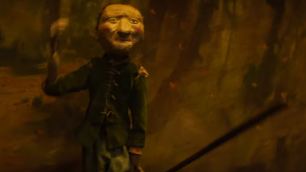29/11/19
Lyceum Theatre, Edinburgh
Does anything embody the theme of Christmas more perfectly than a generous helping of Charles Dickens? A Christmas Carol remains one of his most popular books – indeed, the images it contains pretty much sum up the British public’s entire concept of Christmas. Victorian costumes, decorated trees, festive feasts and of course, copious snow tumbling from the heavens. Tony Cownie’s spirited retelling of the story adds an extra ingredient: Edinburgh. And it works like a charm.
Actually, there’s solid reasoning behind this addition. There’s evidence to suggest that Dickens found inspiration for his most enduring character during a visit to Canongate Churchyard, where he spotted a tombstone commemorating a certain Ebenezer Scroggie, and even made a note about it as a potential character name for future use. Sadly, the gravestone is no longer there (lost during restorations in 1932), but Dicken’s inventive story still dazzles.
In An Edinburgh Christmas Carol, Scrooge (Crawford Logan) is a dour, curmudgeonly man, forever sneering and rolling his eyes at his good natured clerk, Rab Cratchit (Ewan Donald), and nimbly avoiding all who ask him for contributions to good causes. This sprightly version sticks fairly closely to the original story, but throws in a local legend in the furry shape of Greyfriar’s Bobby, still sleeping on his master’s grave, and in danger of being banned from the city for want of a licence. Would Ebenezer like to contribute to the cost of buying one? Bah! Humbug!
The addition of Bobby is a bit of a master stroke. This is the most family-friendly festive offering we’ve seen at the Lyceum, and the youngsters in tonight’s audience are clearly entranced by the puppet versions of Bobby and Tiny Tim. It’s not all lighthearted. There are those pesky ghosts, for starters. A little girl sitting behind me finds the presence of a headless drummer momentarily overwhelming, but she’s soon back to being delighted by all she sees.
There’s also plenty for older audience members to enjoy, not least the gorgeous set design by Neil Murray, which captures the somber beauty of Edinburgh, and when combined with Zoe Spurr’s dramatic lighting shows off the city to great effect. There’s humour too in the witty dialogue, and those who enjoy a festive singalong are well served by the presence of the Community Choir, who offer a series of rousing carols throughout the production. What else do we need to create a perfect Christmas treat? You want snow? You’ve got it!
Even a dedicated Scrooge like me emerges from this production with a warm glow inside (and I swear it’s not just the mulled wine!). Christmas cheer seems to be in rather short supply this year, so why not head on up to the Lyceum for a much-needed top up? I’m pretty sure you’ll enjoy the experience.
4.6 stars
Philip Caveney





























